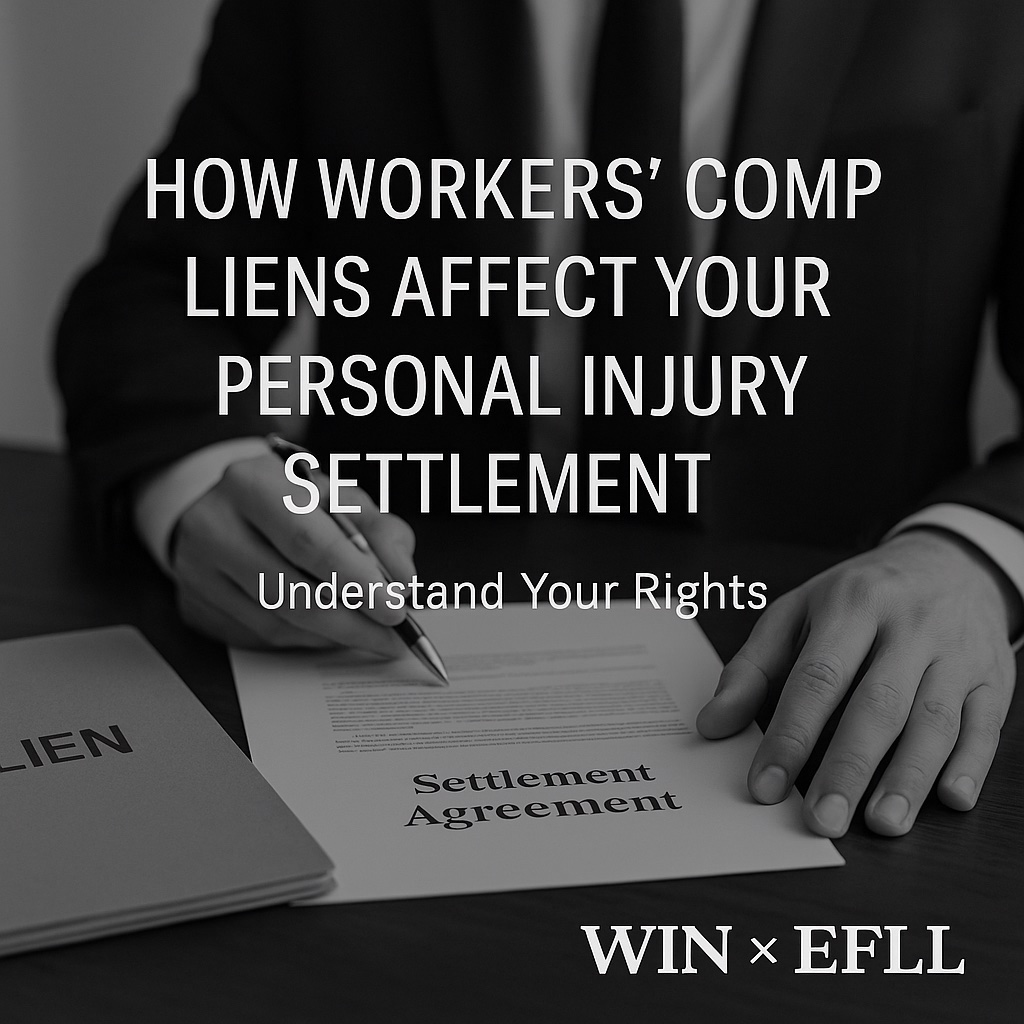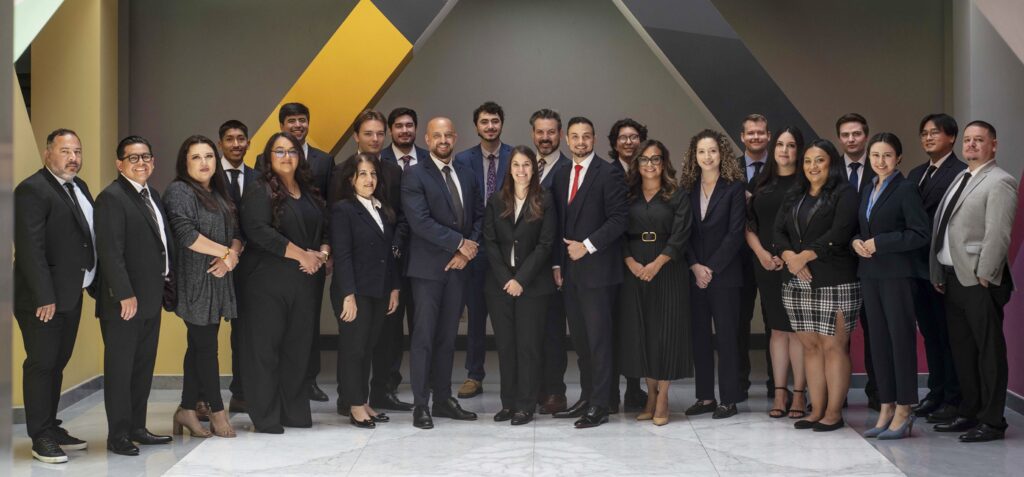
What Injured Workers Need to Know About Coordinating Both Claims
If you were hurt at work but another party caused your injury — such as a negligent driver, subcontractor, or equipment manufacturer — you may have both a workers’ compensation claim and a personal injury claim.
That’s good news for your total recovery — but it also means the workers’ comp insurer will likely place a lien on your personal injury case.
At WIN Trial Lawyers and Employees First Labor Law (EFLL), we specialize in these crossover cases, helping clients maximize their civil recovery while resolving liens efficiently so more money stays in your pocket.
What Is a Workers’ Comp Lien?
When your workers’ compensation insurer pays for your medical treatment or disability benefits, it gains a legal right to be reimbursed if you later secure money from a third-party personal injury lawsuit. This repayment right exists because California law prevents injured workers from receiving a “double recovery” for the same injury.
That repayment right is known as a workers’ compensation lien — a formal claim the comp carrier places against your personal injury settlement under California Labor Code §§ 3852–3860. These statutes outline exactly when the insurer can seek reimbursement and how the lien must be handled before any settlement funds are distributed.
In simple terms, the comp insurer is saying:
“We paid for your medical care and wage benefits after your work injury. If you recover money from the person or company that caused it, we are entitled to be paid back.”
This lien can cover a wide range of benefits paid on your behalf, including:
- Medical expenses such as chiropractic care, physical therapy, MRIs, hospital visits, pain management, and surgery
- Temporary disability payments (TTD), which replace lost wages while you’re unable to work
- Permanent disability payments (PD)
- Vocational rehabilitation or job retraining costs, when applicable
- Mileage reimbursement or other ancillary benefits
In many cases, the lien can grow quickly — sometimes reaching tens or hundreds of thousands of dollars, especially if the worker needed extensive treatment or lengthy time off.
However, the existence of a lien does not mean the insurer automatically gets the full amount back. California’s Labor Code strictly limits how much the carrier can recover, requires them to share in attorney’s fees and litigation costs, and permits substantial reductions when the total recovery is limited.
Understanding how liens work — and how to reduce them — is essential to maximizing the value of your third-party personal injury case.
Why Liens Exist
Workers’ compensation is designed to protect employees regardless of fault — but when a third party is responsible, California law prevents “double recovery.”
That means you can’t collect the same benefit twice — once from comp and again from your civil case.
However, the law also protects the worker by allowing deductions for attorney’s fees and costs, ensuring the insurer doesn’t take the full amount before you’re made whole.
How the Lien Affects Your Settlement
When your personal injury case settles, the workers’ compensation lien must be addressed before any settlement funds can be distributed. This lien represents the amount the workers’ comp insurance carrier paid for your medical treatment and wage benefits related to the injury. California law requires that it be resolved, but it does not have to be paid in full.
Here’s what typically happens in a third-party case:
- Your personal injury attorney negotiates directly with the workers’ comp carrier.
The carrier usually asserts a lien for medical bills, TTD benefits, and other payments made on your behalf. Your attorney reviews every line item, challenges improper charges, and negotiates reductions. - The comp insurer is reimbursed for only a portion of what it paid.
Under California’s workers’ compensation and third-party “credit/lien” system, carriers rarely receive 100% reimbursement. They must share in attorney’s fees, litigation costs, and proportional reductions. - Your attorney ensures the lien deduction is fair and legally compliant.
A skilled PI lawyer doesn’t just accept the lien as-is. They apply statutory formulas, case law, and leverage from the civil settlement to secure the lowest lawful lien repayment possible.
The net amount you ultimately receive from your settlement depends on several factors, including:
- The total recovery in your third-party civil case
- The size of the workers’ comp lien before and after negotiation
- Any comparative fault assigned to you in the accident
- Reductions available under California Labor Code §3860, which requires the lienholder to:
- Pay its share of attorney’s fees
- Pay its share of litigation costs
- Accept proportional reductions when recovery is limited
When handled properly, these lien reductions can significantly increase your final payout, sometimes by tens or hundreds of thousands of dollars.
How WIN × EFLL Maximize Net Recovery
Our integrated team manages both cases under one coordinated strategy — so the lien never blindsides you at the end.
We:
- Track all payments made by the comp carrier from day one
- Ensure proper documentation for every benefit paid
- Negotiate lien reductions aggressively based on equities and attorney fees
- Align settlement timing between both cases to avoid early lien enforcement
- Argue apportionment if the comp carrier overstates its lien
Our goal: reduce what the carrier gets back so you keep more of your settlement.
Example: Work-Related Car Accident
You’re a delivery driver hit by a distracted motorist while on the job.
- Workers’ comp pays $50,000 in medical care and $20,000 in temporary disability.
- You later settle your personal injury case for $300,000.
Under Labor Code §3860:
- The comp carrier’s lien is reduced by attorney fees (often 33%) and case costs.
- Your attorney negotiates further reduction for fairness, possibly bringing the reimbursement to $35,000 instead of $70,000.
- You keep the remainder — without double paying your medical bills.
That’s how coordination and strategic lien reduction make a real financial difference.
Timing and Communication Are Critical
One of the biggest mistakes injured workers make is settling their workers’ compensation claim too early—or doing so without coordinating with their personal injury attorney. Even well-intentioned decisions can have serious financial consequences if timing and communication are not handled carefully.
Settling a workers’ comp case prematurely can:
- Waive critical leverage in lien negotiations, making it harder to reduce or compromise the lien later
- Trigger the workers’ comp carrier’s credit rights, allowing the insurer to offset future medical treatment or wage benefits
- Create conflicts between settlements, where resolving one case unintentionally undermines the value of the other
Once certain agreements are finalized, these consequences can be difficult—or impossible—to undo.
That’s why coordination matters. At Employees First Labor Law (EFLL) and WIN Injury & Accident Trial Lawyers, we handle both the workers’ comp and personal injury sides together when cases overlap. This unified approach ensures:
- Strategic timing of settlements
- Coordinated lien negotiation
- Protection of future benefits
- Maximum net recovery for the client
When both cases are managed as part of a single strategy, they work together instead of competing—and injured workers are far better protected.
Legal Basis: California Labor Code §§ 3850–3860
These statutes allow:
- The injured employee to sue the third party
- The employer or insurer to join or intervene in that lawsuit
- Allocation of recovery between the employee, attorney, and insurer
They also require that attorney fees and litigation costs be deducted before any lien repayment — protecting injured workers from unfair double deductions.
Our Dual-Claim Advantage
At EFLL × WIN, we are one of the few California firms uniquely structured to handle workers’ compensation, employment, and personal injury cases entirely in-house. That integrated approach is not just a convenience—it is a strategic advantage that directly impacts results.
Because all related claims are handled under one roof, there are:
- No communication gaps between separate law firms or practice areas
- No conflicting advice about settlement timing or case strategy
- No missed opportunities to leverage one case to strengthen another
Instead, every decision is made with the full legal picture in mind.
This unified structure allows us to develop a single, coordinated case strategy that aligns workers’ comp benefits, employment claims, and personal injury recovery. By controlling timing, negotiations, and settlement structure across all fronts, we move cases more efficiently and avoid unnecessary delays.
The result is faster resolutions and, most importantly, higher net recoveries after liens. We know where liens can be challenged, reduced, or strategically addressed—and we do it every day. In fact, we’ve successfully handled hundreds of cases where effective lien resolution alone made six-figure differences in what our clients actually took home.
When multiple legal claims arise from the same injury, coordination isn’t optional—it’s essential. At EFLL × WIN, it’s built into everything we do.
Serving Injured Workers Across California
We represent construction workers, delivery drivers, healthcare professionals, and employees across Los Angeles, Pasadena, Pomona, Long Beach, and the Inland Empire — ensuring every claim is maximized and every lien minimized.
Call WIN Trial Lawyers × Employees First Labor Law

At WIN Trial Lawyers, we know how devastating distracted driving accidents can be. Victims often face mounting medical bills, lost wages, and emotional trauma. Our team has successfully taken on insurance companies and distracted drivers, recovering millions for injured clients.
If you or a loved one has been injured in a speeding-related car accident, don’t leave your future in the hands of the insurance company. You need experienced trial lawyers who know how to prove liability and fight for maximum compensation.
If you or a loved one has been injured in a distracted driving accident, don’t face this alone. The sooner you act, the stronger your case will be.
🔗 Related Posts:
Frequently Asked Questions: How Workers’ Comp Liens Affect Your Personal Injury Settlement
What is a workers’ compensation lien?
A workers’ compensation lien is a legal claim by the workers’ comp insurance carrier to recover benefits it paid (such as medical treatment and temporary disability) from any personal injury settlement or verdict you receive from a third party. The lien is meant to prevent double recovery for the same injuries.
Why does a workers’ comp lien apply to my personal injury case?
If you were injured on the job due to someone else’s negligence—such as a negligent driver, equipment manufacturer, or subcontractor—you may have both a workers’ comp claim and a personal injury claim. When that happens, workers’ comp has a right to reimbursement from the third-party recovery.
Does the lien take my entire settlement?
No. A workers’ comp lien does not automatically take your entire settlement. Liens are often negotiable, and the final amount depends on factors such as:
- The total settlement amount
- The amount of workers’ comp benefits paid
- Attorney’s fees and litigation costs
- Comparative fault issues
In many cases, an experienced attorney can significantly reduce the lien.
Can a workers’ comp lien be reduced?
Yes—very often. Common lien reductions include:
- Attorney fee reductions (the carrier must usually share in fees and costs)
- Compromise and release negotiations
- Equitable reductions when the settlement does not fully compensate the injured worker
Lien negotiation is a critical part of maximizing your net recovery.
What if my personal injury settlement is smaller than the workers’ comp lien?
If the settlement is limited, the lien may be reduced or eliminated depending on the circumstances. Courts and insurers recognize that injured workers should not be left with nothing after attorney fees and costs. This is where strategic negotiation is essential.
Does workers’ comp get reimbursed for pain and suffering?
Generally, workers’ comp benefits do not compensate for pain and suffering—but the lien can still attach to the overall settlement. However, allocation strategies may help protect non-economic damages in certain cases, depending on state law.
What happens to future workers’ comp benefits?
In some cases, the workers’ comp carrier may claim a credit against future benefits after a third-party recovery. This can affect future medical treatment or wage replacement unless the case is carefully structured.
Do I need to tell my personal injury lawyer about my workers’ comp claim?
Absolutely. Failing to disclose a workers’ comp claim can jeopardize your settlement and delay payment. Coordination between the two cases is essential to:
- Avoid legal conflicts
- Properly address liens
- Maximize your overall recovery
Can I handle a workers’ comp lien on my own?
You can—but it’s rarely advisable. Lien laws are complex, and insurers aggressively protect their reimbursement rights. Without experienced representation, injured workers often leave significant money on the table.
Can a workers’ comp lien delay my personal injury settlement?
Yes. If a workers’ comp lien is not properly addressed, it can delay distribution of your settlement funds. Insurers often require lien resolution or agreement before releasing settlement proceeds. Proactive lien negotiation helps avoid unnecessary delays and ensures you receive your money faster.
What if my workers’ comp claim is still open when my personal injury case settles?
This is common. When a workers’ comp case is still open, the carrier may assert both a lien for past payments and a credit against future benefits. An experienced attorney can often structure the settlement to limit how the credit is applied and protect ongoing medical care.
Does comparative fault affect a workers’ comp lien?
Yes. If you are found partially at fault for the accident, the workers’ comp lien may be reduced proportionally. Courts and insurers recognize that it is unfair for a carrier to recover 100% of its lien when the injured worker’s recovery was reduced due to fault.
Are all workers’ comp payments included in the lien?
Not always. Certain payments may be excluded or overstated. Part of effective lien negotiation involves auditing the lien to ensure it only includes legally recoverable benefits and not unrelated or improperly claimed expenses.
What happens if I settle my personal injury case without resolving the lien?
This can create serious problems. The workers’ comp carrier may pursue repayment directly from you or even your attorney. Proper lien resolution protects you from future claims and ensures your settlement is final and secure.
How does WIN Injury & Accident Trial Lawyers handle workers’ comp liens?
At WIN Injury & Accident Trial Lawyers, we coordinate workers’ comp and personal injury claims strategically. We:
- Identify and challenge improper lien amounts
- Negotiate aggressive lien reductions
- Structure settlements to protect our clients’ net recovery
📞 Contact WIN Injury & Accident Trial Lawyers for a free consultation.
We don’t just win cases—we maximize what you take home.



